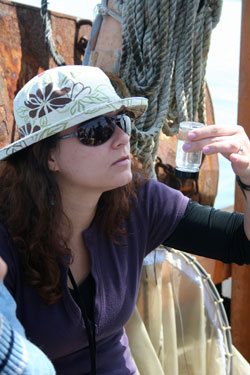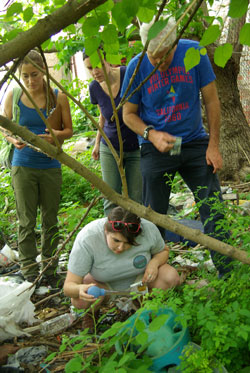MBL Awards Fellowships to Science and Health Journalists to “Get Their Hands-On Research”

Contact: Diana Kenney
508-289-7139; dkenney@mbl.edu
WOODS HOLE, Mass. – Fifteen science journalists have been awarded Logan Science Journalism Fellowships from the Marine Biological Laboratory (MBL), an international center for biological, biomedical, and environmental research and training and an affiliate of the University of Chicago.
Now in its 29th year, the Logan Science Journalism Program (SJP) allows established science and heath journalists from around the globe to "step into the shoes of the scientists they cover" through immersion in hands-on research at the MBL. This year’s program, which offers fellows the choice of a laboratory-based Biomedical research course or a field-based Environmental research course, will run from May 27 to June 6.
 2009 Biomedical Fellow Juliana Tiroboschi on the MBL's specimen collecting vessel, the R/V Gemma.
2009 Biomedical Fellow Juliana Tiroboschi on the MBL's specimen collecting vessel, the R/V Gemma.The 2015 Logan SJP Fellows are:
Biomedical Fellows
Steven Ashley*, Freelance Journalist
Rachael Buchanan, Medical Producer, BBC News
Nancy Cohen, Freelance Radio Journalist
Jin Nishikawa*, Staff Writer, The Asahi Shimbun
Jane Palmer, Freelance Science Journalist and Radio Producer
Sumathi Reddy, Health Reporter, The Wall Street Journal
Mark Wolverton, Freelance Science Writer and Author
* Woods Hole Fellow
Environmental Fellows
Carolyn Beeler, Health and Science Reporter, WHYY (NPR, Philadelphia)
Giovana Girardi, O Estado de S. Paulo (Brazil)
Christopher Joyce, Correspondent, National Public Radio (NPR)
Amy Quinton, Environmental Reporter, Capital Public Radio (NPR, Sacramento)
Yves Sciama, Environmental Editor, Science et Vie (France)
Christopher Smith-Gonzalez, Reporter, The Galveston County Daily News
Meera Subramanian**, Freelance Journalist
Michael Werner**, Freelance Journalist / Filmmaker
**Arctic Field Experience Fellow
In the Biomedical Hands-On Course, fellows are plunged into the world of basic biological discovery that underpins current biomedical research. Fellows will use both genetic model systems and marine invertebrates to gain exposure to fundamental techniques and concepts in cell, molecular and developmental biology. In addition, they will attend basic neuroscience talks and demos to gain insight into neurodegenerative disease research, as well as the new technologies that fuel current brain mapping efforts, such as the federal BRAIN Initiative.
Two of the Biomedical Course fellows, Steven Ashley and Jin Nishikawa, were also awarded Woods Hole Fellowships to spend an additional two weeks at the MBL participating in its renown Summer Courses. Ashley will audit the Brain, Mind and Machines course and Nishikawa will attend lectures and labs in several MBL courses, including Embryology, Physiology, and Neurobiology.
The Environmental Hands-On Course fellows will undertake field and laboratory research at a unique, large-scale ecosystem experiment in the Plum Island salt marshes, north of Boston. Fellows will be introduced to the experiments that scientists conduct, and the measurements they make, to discover the complex ways that added nitrogen alters a coastal ecosystem. Upon compiling samples and measurements, they will return to MBL to analyze and interpret their data.
 A scientist from the Baltimore Ecosystem Study project helps 2014 Environmental Fellows collect samples. Standing from left are Codi Kozacek (Circle of Blue), Susan Phillips (NPR-WHNY), and Nick Clark (Al Jazeera English).
A scientist from the Baltimore Ecosystem Study project helps 2014 Environmental Fellows collect samples. Standing from left are Codi Kozacek (Circle of Blue), Susan Phillips (NPR-WHNY), and Nick Clark (Al Jazeera English).Two of the Environmental Fellows, Meera Subramanian and Michael Werner, have also been awarded Arctic Field Experience Fellowships. In July, they will travel to Alaska’s North Slope and spend one week with ecosystems scientists pursuing field research at Toolik Field Station, including studies of global climate change.
Over the years, the Logan Science Journalism Program has granted fellowships to hundreds of journalists from prominent news organizations, including The New York Times, The Wall Street Journal, Science, National Public Radio, The Washington Post, USA Today, CNN, and Scientific American. Journalists from Africa, Brazil, Qatar, Sweden, India, Japan, the United Kingdom and other countries have also received fellowships.
The Biomedical Hands-On Research Course is co-directed by Charles “Brad” Shuster of New Mexico State University and Phong Tran of the University of Pennsylvania Perelman School of Medicine. The course’s journalism director is Robin Marantz Henig, author and contributing writer, New York Times Magazine. The Environmental Hands-On Research Course is directed by Linda Deegan, senior scientist in the MBL Ecosystems Center. Science journalist/producer Angela Posada-Swafford, a U.S. correspondent for Madrid’s Muy Interesante Magazine, is the Environmental Course’s journalism director.
The Logan Science Journalism Program is supported in part by George & Helen H.B. Logan; Friends and Alumni of the Science Journalism Program; Golden Family Foundation; Howard Hughes Medical Institute; Irving Weinstein Foundation, Inc.; Ross Foundation; and Waksman Foundation for Microbiology.
—###—
The Marine Biological Laboratory (MBL) is dedicated to scientific discovery and improving the human condition through research and education in biology, biomedicine, and environmental science. Founded in Woods Hole, Massachusetts, in 1888, the MBL is a private, nonprofit institution and an affiliate of the University of Chicago.